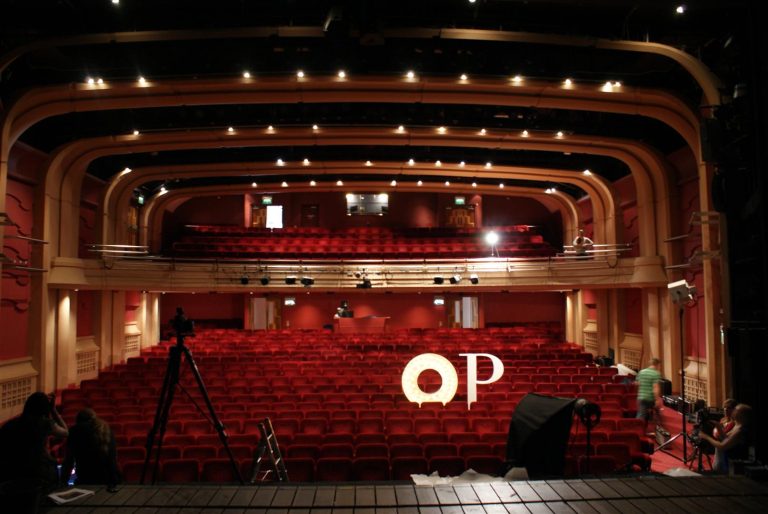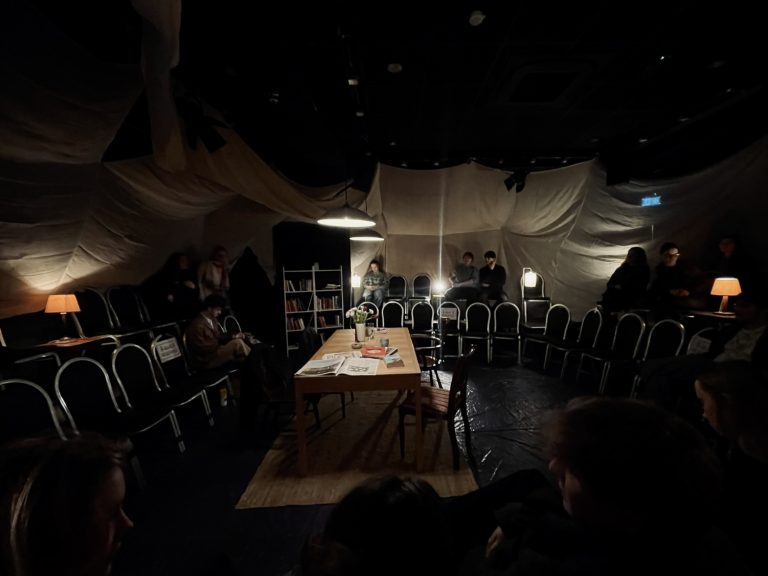Last term, I performed in my first show at Oxford University, and I couldn’t stop talking about it. Everyone I knew was subjected to my monologues about rehearsals and costumes and casting, and most of my friends met this with remarkable patience. One friend of mine was also in a play, and we ended up trading notes on our experiences.
Both shows were Oxford student theatre, but mine was Shakespeare and hers was contemporary. The differences didn’t end there. I had no idea of the budget for mine – all I knew was we had enough for frequent snack runs during rehearsals, and for very nice drinks at the cast party. My friend knew all too well the state of her show’s finances. Instead of discussing our acting choices, I heard about the fundraising, production, and marketing woes befalling her show. And I wondered which one of our experiences was more common.
At first glance, it seemed like hers. Over half of respondents to a survey on Oxford student theatre funding stated that the budgets of the shows in which they had participated were moderately low (Figure 1). They cited a “long confusing process” to secure funding, loans that were “daylight robbery”, and “fighting over limited funding”.
There are several archetypical budgets. The Oxford University Drama Officer, Noah Wild, encourages producers not to exceed a breakeven percentage of 60% in their budgets, meaning that total expenditure, generally, should not exceed 60% of their ticket sales. As a result, there are differing budgets for different venues. Shows at the Burton Taylor Studio (“the BT”) are unlikely to exceed £720. Shows at the Michael Pilch Studio have a ceiling of around £1,500. At the Keble O’Reilly, it’s around £3,500. And at the Oxford Playhouse, where the most “professional” productions are performed, the budgets will stretch to £24,000.
The ways that budget impacted the production itself were myriad. Most reported technical limitations: one show had to choose between the entire cast having mics, or none of them, and could not afford the former. Practical effects would be limited to Playhouse shows, notorious for their expense, and the trade-off for elaborate costumes would often be a threadbare set and lighting.
Even before design was considered, a production’s budget impacted far more fundamental aspects, like which show would be put on at all. Shakespeare can seem endemic in student theatre (this term alone has King Lear, Richard II, Romeo & Juliet, and The Merchant of Venice being performed in various venues), but there is a strong financial incentive. Since they are all in the public domain, there is no estate to contact, no stipulations to abide by, and no rights to purchase.
For contemporary theatre, particularly for small-scale productions, rights can take up almost half of the budget, in some cases costing more than venue hire. Translated scripts prove even more difficult, since the copyright attaches to the translation, as well as the original. Even plays written centuries ago may require budget allocations for rights, because the translation is not in the public domain. For one respondent, the cost of licensing pre-existing licenses was so much that they were translating the play from Italian themselves.
Funding Oxford drama
There are two primary forms of funding for Oxford student theatre: grants and loans. Grants can come from JCRs, college societies, and the Cameron Mackintosh Drama Fund (CMDF), while the Oxford University Dramatic Society (OUDS) offers pro-rata loans. Productions that receive these loans must pay back the amount they borrowed plus a share of the profits; a loan worth 25% of the budget would be repaid with the amount itself and 25% of the profits. One hundred per cent of the respondents stated that they had used JCR or MCR funding in their productions, and just under three-quarters used OUDS loans or CMDF grants (Figure 2).
Grants and loans are not the only dividing lines for funding sources. OUDS and the CMDF are drama-specific entities. As an entity created to fund student drama, the CMDF takes an interest in ascertaining how best they can help beyond the bare provision of grants. The University Drama Officer exists to facilitate and support student theatre, and to liaise between production companies and the CMDF. In service of this, he has introduced numerous changes in order to make funding more accessible. This term, he is running production workshops to help first-time producers make funding bids. Additionally, he advises bidders on the best way to structure their budget. The next innovation will be a requirement for all shows receiving CMDF funding to submit a financial report at the end of their production, so that the Fund can better see which areas to aid.
Similarly, the Treasurer of OUDS, Chess Nightingale, has been closely involved in ensuring as many production companies as possible secure funding. Nightingale circulates a funding provocation form each term, when bids for theatres open, advising how best to structure the form to ensure acceptance. Reels on the OUDS Instagram are aimed at debunking common myths, and a new website is currently in development to better convey key information like deadlines and expected awards. She stated that OUDS “rarely reject applications” and never “purely on technicalities”.
In contrast, JCRs and MCRs are not designed with the purpose of funding student drama, which can lead to some issues. They have other priorities, and therefore may be more likely to refuse or to limit the amount allocated. On average, they contribute between £50 and £200, depending on the number of students from that college involved in the production.The utility of JCR funding will also depend on the colleges making up the production team and the actors, since wildly different levels of funds exist between each.
Some colleges have their own arts societies, but they may also have a more convoluted method of securing funding. For example, the Brazen Arts Fund (Brasenose) is unaffiliated with the JCR, and will only reimburse receipts, limiting the extent to which they can be used in the development of a show. College drama societies may also introduce stipulations, such as the proportion of students from that college who must be in the performance, or for a committee member to be in the production team.
Still, it is relatively simple, administratively, to request funding from JCRs, and such funding is a well-known source. The nature of their grants means that all of the profit from a show can be retained, and potentially reinvested into the next. This is unlikely to cover a full production, being more effective as an ad-hoc supplement.
The less centralised structure of Oxford student theatre is partly a result of abundant sources of funding. At other universities, like Newcastle, LSE, and York, there is a central dramatic society, funded by ticket sales, membership fees, and the Student Union. The numerous external sources of funding for Oxford drama limit the need for centralisation.
While the production companies in Oxford are affiliated with OUDS, they are autonomous entities, which allows them the freedom to put on whatever show they wish. But this autonomy goes both ways. If a company doesn’t have a knowledgeable producer or an experienced stage manager, there are no guardrails. As a result, significant polarisation is possible between the resources and expertise of prominent companies with a strong track record, compared to smaller, first-time companies. The availability of central funding limits the disparity here somewhat – the alternative of JCR funding is once again dependent on the composition of the production company. One respondent identified tension from different companies “fighting over limited funding”, but without OUDS and the CMDF, such fighting would only intensify.
Audience experience
The budget of a play didn’t make a considerable difference to the audience members’ enjoyment. When asked whether they enjoyed watching larger scale or smaller scale performances, the vast majority stated that “it depends” on a far wider variety of factors. Only one person had a preference at all, and that was for smaller shows, because “they often have more time and love put into them”. For them, Playhouse shows, with budgets of over £20,000, had never been “anything better than just fine.”
Among the rest of the respondents, one criterion stood out: how well a show knew what it wanted to be. The only relevance of the budget was whether it was “in line with ambitions”. As a result, there was something of an expectation gap between different venues. Those at the Playhouse, which signified a higher budget, brought higher expectations. Respondents admired the “spectacles” that could be created, and their potential to be “impressive, exciting, and immersive”. The flipside of this was a lack of risk in terms of content. The need to break even, when that number is in the tens of thousands, meant that high budget shows tended to stick to established work that would bring in an audience. No-one disputed the technical marvel that could be produced with a larger budget. But several remarked that, with higher expectations set, there was a greater risk of falling short.
With a lower amount needed to break even, smaller shows could take more risks, and the more basic set design meant an unflinching focus on the performers themselves. Respondents enjoyed smaller venue shows for “intense moments”, “subtle emotions”, and “real gems of new writing”. In both cases, the quality of the show to the audience was not tied to the budget, because they knew to expect different things from different productions. “Quality drama” above all, was the most important consideration. That isn’t necessarily guaranteed by money.
Funding from an actor’s perspective
In terms of ideal productions in which to participate, opinion was more divided. Over a quarter preferred larger-budget productions, although it still depended on other factors for half. The throughline for those preferring larger productions was a sense of security. The necessary resources were already in place, so the actors could focus on what they were doing in the play, rather than worrying about what was going on backstage.
In particular, the presence of “extra” features made a difference, like intimacy direction and choreography. Intimacy direction is a recent, fought-for inclusion to OUDS, and still remains difficult budgetarily. Wild estimated that a significantly discounted professional intimacy director was around £450 a day; more than it costs to hire the BT. One interviewee spoke of having a student intimacy director, who was not involved in rehearsals, and only came on the day of the show to check the entire production. The lack of thoroughness and organisation contributed to a feeling of discomfort, impacting the actors’ enjoyment of the play.
“Professional” was often used to describe better-funded plays. Whether this is guaranteed depends on how you view professionalism. Onstage, a larger budget goes a long way to make a show appear professional, with a cohesive set design, fantastic practical effects, and the lack of obviously borrowed props or costumes. One respondent talked of the “OUTTS chair” – a style of prop that you’d instantly recognise if you’d ever been involved in a play. The immersion for the audience, and the actors, is more likely to be secured with these design considerations, meaning that funding may be important for a more professional production.
But there is another sense of professionalism that cannot so easily be seen from the stalls. Conduct and organisation backstage impacts the experience of everyone involved in the production, and this depends on the cohesion of the cast and crew, not the set, which is far more difficult to secure with money alone. Tensions may be lessened when there is a sufficient budget, but a dedicated production crew, a well-equipped producer, and a welfare officer who knows that their role goes beyond providing snacks are no less necessary. Improving comfort backstage is not necessarily a question of more money, but of a more purposeful approach to putting on a show. That’s something that can only really be built from experience.
The opportunities to build this experience in student theatre are nearly unparalleled in Oxford. Only Cambridge was brought up as a potential competitor. One respondent, who graduated in 2023, explained the sharp contrasts of her experiences with student theatre at Oxford and at her subsequent university. There was “almost no funding”, leaving them reliant on ticket sales and often suffering losses, making musicals increasingly unsustainable. The variety was limited, having to “carefully… pick shows that will bring in a big audience in order to make our money back”. There were less direct comparisons too – the tech resources available from the Oxford University Technical Theatre Society (OUTTS) are discounted compared to commercial rates, and the CMDF pays for the electricity in the BT.
Oxford student theatre’s variety is its strength. It allows for shows that are new, experimental, and genuinely exciting, while also creating masterpieces of technical skill that allow actors and crew alike to develop their abilities. The money available ensures such an assortment can be performed, but equally important is how well the cast and crew work together. If funding remains accessible to all, as OUDS and the CMDF are working to ensure, then the show will always go on.













